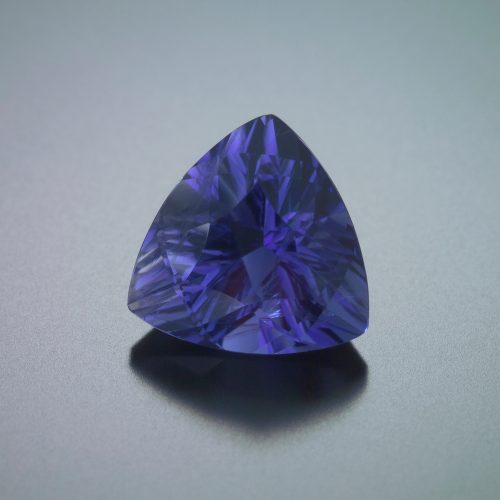
Etymology
The name, iolite, originates from the Greek word “iodes” meaning violet. It is often found under the misleading name of water sapphire.
Iolite Facts
The gemstone iolite is the transparent form of the metamorphic silicate mineral Cordierite. Strong trichroism causes this gem to look alternately dark blue-violet to violet, lighter blue, and colorless to light yellow when looked at from different directions. The refractive indices of iolite are 1.542 to 1.551, very similar to that of quartz. There is however, no difficulty in separating the two gems because of iolite’s very strong trichroism.
Iolite deposits usually occur along with andalusite, kyanite and sillimanite, the alumino-silicates. Typically iolite gemstones are no greater than 12 carats, however, extremely large rough stones have been found in recent discoveries in Palmer Canyon Wyoming. A 1714 carat nodule of iolite, the world’s largest at the time, was discovered there and is known as the “Palmer Canyon Blue Star.” Subsequently, iolite has been found in various locations throughout the Laramie Range. Pebbles of iolite in Sri Lanka and porphoyroblasts in Wyoming comprise the finest quality iolite gems worldwide.
Historically, iolite is the stone most popularly believed to have been used as a polarizing filter by the Vikings. Peering through thin slices of iolite they could navigate on cloudy days by figuring the direction of the sun through the iolite filter. This innovation (whether iolite or some other gem material) enabled explorers to venture away from familiar landmarks along the coastlines and into the unexplored vastness of the oceans.
Discovery Timeline for Iolite
| Time | Locality | Comments |
|---|---|---|
| c. 789-1066 | Norway | Vikings used Iolite's pleochroism as a tool to navigate by and as a polarizing filter to look at the sun. |
| 1813 | Cordierite (gem family of Iolite) was named for the French geologist, Pierre Cordier (1777-1861) | |
| Sri Lanka | Gem mining here for as long as history has been recorded. | |
| India | Iolite is found in several Indian localities and has been mined there since classic history. | |
| Myanmar | ||
| Northern Territory, Australia | ||
| Namibia | ||
| Brazil | ||
| Tanzania | ||
| 1994 | Madagascar | |
| Connecticut, USA | ||
| Yellowknife, Northwest Territories, Canada | ||
| 1996 | Palmer Canyon, Wyoming, USA | Very large rough stones. |
Gemological Information for Iolite
| Color: | Blue |
| Crystal Structure: | Orthorhombic |
| Refractive Index: | 1.54-1.55 |
| Durability: | |
| Hardness: | 7.5 |
| Family: | Codierite |
| Similar Stones: | Amethyst, Sapphire, Tanzanite, Tourmaline |
| Treatments: | None Known |
| Country of Origin: | India, Tanzania, Brazil, Sri Lanka, Madagascar |
Iolite Care
| Ultrasonic Cleaning: | Risky |
| Steam Cleaning: | Risky |
| Warm Soapy Water: | Safe |
| Chemical Attack: | Acids Attack |
| Light Sensitivity: | Stable |
| Heat Sensitivity: | Fusing |
Sources
- Iolite: the “Viking Compass” Finding the Hidden Sun with this Remarkable Stone (copyright 2000 – 2008). Retrieved March 23, 2010. http://www.nordskip.com/iolite.html
- Liddicoat, Richard T. Handbook of Gem Identification, Los Angeles: Gemological Institute of America, 1962. Pp. 218-219.
- World-Class Colored Gem Deposits in Wyoming (2009, February 27). Retrieved March 23, 2010, from http://iolite-wyoming.blogspot.com/